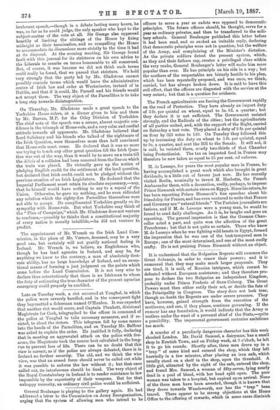Late on Tuesday week, a riot occurred at Youghal, in
which the police were severely handled, and in the consequent fight they bayonetted a fisherman named O'Hanlon. It was expected that another riot would occur, and Captain Plunkett, divisional Magistrate for Cork, telegraphed to the officer in command of the police at Youghal to take summary measures, and if re- sisted, to shoot the rioters. This telegram fell by some means into the hands of the Parnellites, and on Tuesday Mr. Balfour was asked to explain the order. He justified it fully, declaring that in meeting an aggravated attack on the police with fire- arms, the Magistrate took the course best calculated in the long. run to prevent loss of life. There can be no doubt that this view is correct, as if the police are always defeated, there is in Ireland no farther security. The old, and we think the wise view, was that an armed force should never be called out while it was possible to enforce the law without it ; but that once called out, its interference should be final. The very object of the Royal Constabulary in Ireland is to render resistance to law impossible by the superiority of their weapons. But for that unhappy necessity, an ordinary civil police would be sufficient.


































 Previous page
Previous page